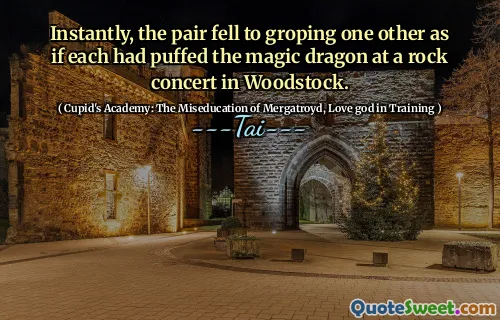
Instantly, the pair fell to groping one other as if each had puffed the magic dragon at a rock concert in Woodstock.
This vivid quote captures a spontaneous and intense moment of passion between two individuals. The imagery used—comparing their actions to someone puffing the magic dragon at a Woodstock concert—evokes a sense of wild abandon, nostalgia, and unrestrained emotion. The phrase 'magical dragon' is a reference to the classic song 'Puff the Magic Dragon,' which as a childhood lullaby, also symbolizes innocence and fantasy. Contrasting this with the rawness of the scene hints at a divergence from innocence into a state of unfiltered desire. The setting symbolized by Woodstock, known for its legendary music festival that epitomized the 1960s counterculture, further reinforces themes of liberation, freedom, and breaking societal taboos. The spontaneous fallen-into-each-other trope underscores the unpredictability and impulsiveness that often accompany youthful or rebellious passions.
This snippet makes me reflect on how moments of intimacy and human connection are often driven by primal urges and uninhibited emotions. The choice of words paints a picture of youthful exuberance where inhibitions are shed, and one embraces the moment with reckless abandon. It emphasizes the idea that sometimes, the most authentic experiences come from moments of pure impulsiveness, free from rational constraint. These scenes evoke the universality of desire—a universal facet of human experience that, at its best, can be both exhilarating and raw. Moreover, it highlights how cultural touchstones and nostalgic references influence the way we interpret and frame human experiences—linking a pop culture phrase to a deeply intimate act. Overall, this quote beautifully encapsulates the volatile and magnetic nature of passion, set against a backdrop soaked in cultural history and collective memory.






